I never expected Luc Besson’s Lucy to be good in any normal sense of the term, but I did think it would be so harebrained that it might provide 90 minutes of unintended amusement. Well, it most assuredly is harebrained. In fact, that’s an insult to rabbits of all kinds. This is more like amoeba-brained, or maybe amoebas-on-drugs. I expected dumb. An incomprehensible mess punctuated with cheese-encrusted CGI effects, phony philosophizing and outbursts of tedium, I did not. The unintentional mirth I had hoped for amounted to no more than two or three contemptuous snorts at the aggregation of asininity — not to mention the cosmic incompetence — on the screen. Someone will undoubtedly tell me that this is one of those films that you enjoy by “checking your brain at the door.” Well, that’s clearly what writer-director Luc Besson did before creating this thing, but I see no point in lowering myself to his lobotomy.
Generally speaking, I have nothing — well, not much anyway — against Besson. After his early period as an overrated filmmaker — and the critical and commercial disaster of his 1999 The Messenger: The Story of Joan of Arc (starring his then-wife Milla Jovovich as Joan) — he settled into the role of producer, frequent writer and occasional director of schlock action pictures (and the odd children’s film). These films were of little discernible merit but largely of no great harm. For some reason, he seems to be of a mind to re-establish himself as a filmmaker of note — and this curdled concoction of undigested Kubrick and barely assimilated Malick is his apparent attempt at this. The terrifying thing is that there’s a good chance that Lucy is going to be a hit. Whether this has anything to do with Besson’s filmmaking and storytelling or is solely based on the prospect of seeing Scarlett Johansson kicking ass as the pseudo-superheroine of the title is an unsettled point.
OK, let’s go ahead and admit that the basic premise of the movie — the whole we-only-use-10-percent-of-the-brain biz — is a load of clams. That idea has been long refuted, but I knew this going in and was still willing to go with all this hooey. It didn’t take long for the film itself to evaporate any good will I might have mustered. The erosion started when the movie thought it was being clever and cinematic by cutting away to childish bits of symbolism portraying hapless Lucy (Johansson) as a mouse being lured into a trap, or being a gazelle pursued by a cheetah, etc. In the film’s favor, it soon dropped this idiocy, but it never occurred to anyone to go back and cut it out, which cancels out any significant plus value.
I’m not about to catalogue all of the movie’s sins — a priest at a cinematic confessional would skip the Hail Mary and Our Father stuff and jump right into hair shirts and flagellation for Besson’s penance. Let’s just say that almost nothing makes any sense — and I’m not even talking about this designer drug (that looks like bright blue aquarium gravel) that preposterously gets into Lucy’s system and turns her into the Smartest Person Who Ever Lived — complete with all sorts of superpowers. No, I’m talking about the actions of every character in the picture — including the supposedly superintelligent Lucy. I don’t mind that this drug allows her to writhe up a wall and across the ceiling as if Fred Astaire was having a seizure in Royal Wedding. I do mind that Mr. Jang’s (Min-sik Choi, Oldboy) henchmen haven’t been told, “Hey, don’t kick her in the abdomen. We just sewed up a bunch of drugs in there.” I don’t care that Lucy can telekinesis up a storm of bleeding noses, floating firearms and hovering bad guys — not to mention turning on and off electrical devices without the aid of a Clapper. No, I’m good with that. I’m less good with why she doesn’t just go all Amy Irving on Mr. Jang and explode him like John Cassavetes in The Fury (1978), rather than wait for him and his endless stream of goons to shoot up Paris.
In the midst of all this, we have poor Morgan Freeman trying to make this nonsense sound “scientific” and plausible. (I haven’t encountered anything this pathetically unpersuasive since 2008 when I listened to Ben Stein ramble on in Expelled: No Intelligence Allowed.) Better yet, we have the movie’s supposedly mind-blowing sequence where our Lucy sits in an office chair and goes on some kind of amazing journey on the road to 100 percent brain capacity (onscreen titles keep us abreast of where she is percentage-wise). That scene manages to cobble together 2001 (1968), The Tree of Life (2011), Altered States (1980), the Sistine Chapel ceiling (reconfigured with Scarlet Johansson and the Australopithecus Lucy) — and more. The problem is that this all sounds more interesting — at least in a trainwreck way — than it actually is. Bad effects, stretches of tedium, a somnambulistic performance from genetically modified Johansson and the mistaken belief that all this is somehow profound squelches its screw-loose amusement value very fast. Rated R for strong violence, disturbing images and sexuality.

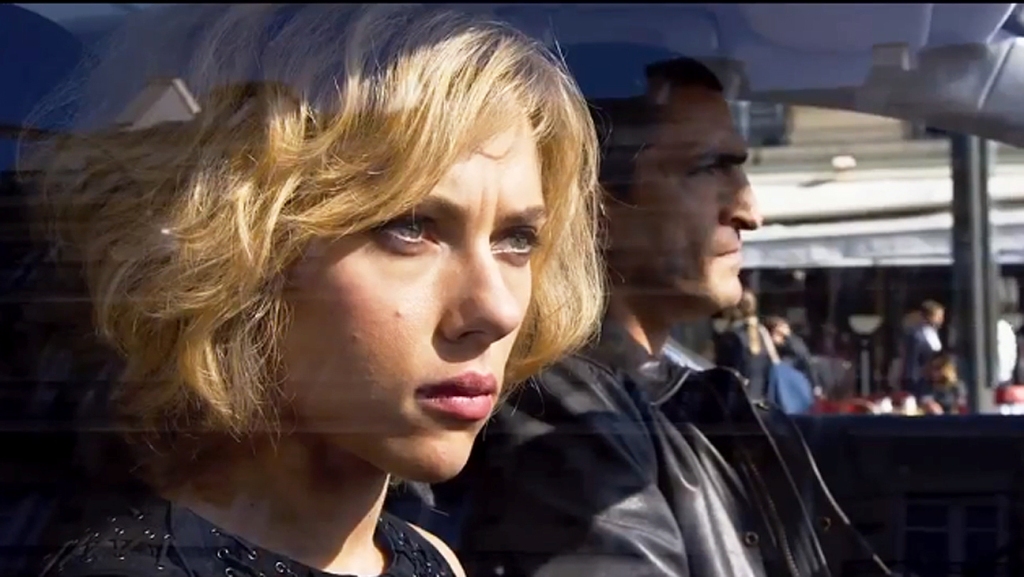
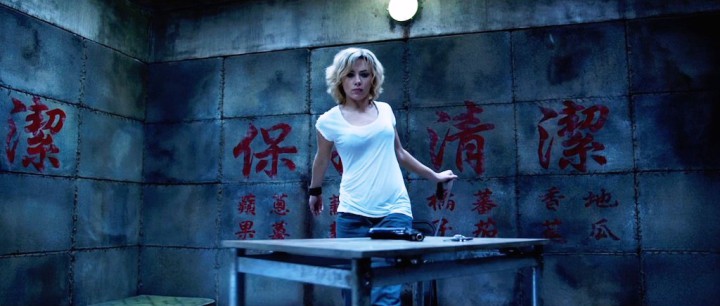

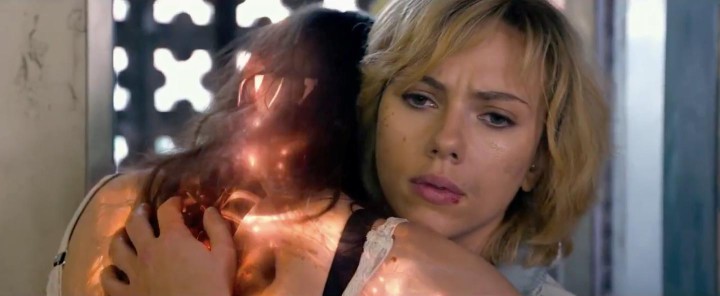
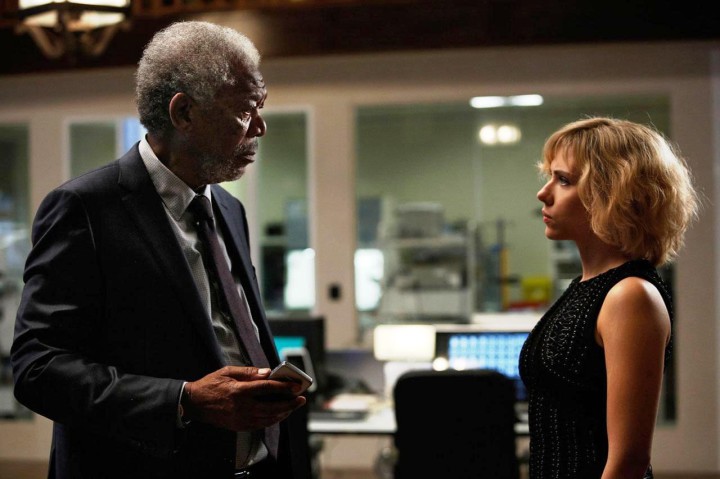
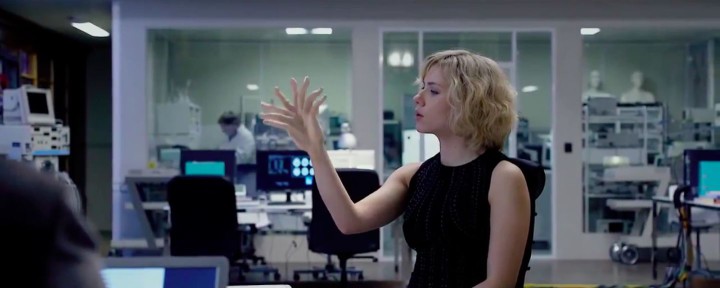
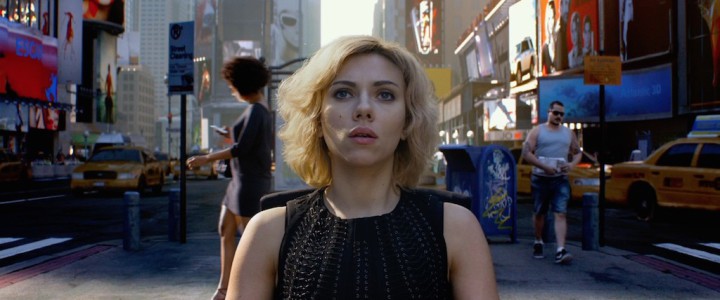

I will now add that I arrived a little early tonight for Rear Window and was subjected to the final 10-15 min. of Lucy. On a second viewing — perhaps realizing that it was going full-on stupid and how meaningless the huge title cards announcing where the percentage of her Brain Power were — it was a whole lot funnier. But then I sat through the ending song and…that was annoying to positively obscene levels.
“Faster, more intense!” – Besson’s direction for Johansson’s numerous writhing scenes.
Far too many people have clicked on this review. Far too few have clicked on The Grand Seduction.
Hi Ken, I know for myself I read the reviews in the actual paper and then only click on the reviews online that people have actually commented on (I’m a bit of a comment reading junkie.) Lucy had 3, The Grand Seduction zero, so viola, here I am! There might be more like me out there?
There are. And there are even more who head straight for the half-star reviews.
I would encourage you to have another try at understanding what Besson was doing with this story. It seems that before it even began, you had decided to not like it, or even give it a chance. There is much here, or there should be, for anyone who has an appreciation for film as a way for the story teller to communicate personal views on humans, humanity, and the world we live in. That message is itself a large part of what this story is about. And it would be hard to miss. It seems anyone who is not just a casual movie goer would have to actively try to NOT see that point, among others made in Luc Besson’s Lucy.
Granted this isn’t Truffaut, or Tati, or Renoir, it’s a Besson actioner, but it is certainly more than it’s given credit for here. Amidst all of the cartoonish action and sci-fi “nonsense” (the quotes are there to emphasize how ridiculous it is to complain about logic and nonsense in a clearly sci-fi movie, especially from someone who still lists the films of Ken Russell amongst his favourites, not that there’s anything wrong with that), are several strong themes about humanity, the fear of death, and the search for immortality. Even the importance of art itself is represented here, as Freeman’s Samuel Norman suggests to Lucy that she take what she sees in the world from her own unique perspective and ‘pass it on’. Because it is important, as are all of our own singular view points, and to give that out to the world is how we can approach something like immortality. Such is the intent of an artist- observation, interpretation, translation. When that moment comes and our physical self is gone from this world, what is it that we’ve left behind? Is it destruction, ala obliterating our enemies simply because we can? Or do we try to create something? Have we tried to looked inward and outward to understand ourselves and each other better? Do we even care? This story encouraged me to care. This story entertained me. Why? Because I let it.
Short anecdote: as my friend and I were leaving the auditorium, a person in the group walking ahead of us said, “I liked it. It was a little too ‘Discovery Channel’, but I liked it.” I have a feeling that that is as far as the reading of this film will go with this particular group and many others, and it’s disappointing to a degree that most audiences today only get that far. Just short of dismissal. With which group do you walk?
No, I did not go in expecting to dislike it. I went in expecting dumb fun. Instead, as I said, I found an incoherent mess. It strikes me as much in the same vein as a lot of Euro — especially Italian — horror, which is to say that it’s so incredibly muddled that you can make it mean anything you want it to. I’m sorry, but while I can see where there are passing references to deeper themes, I don’t see much in the way of follow through. Are you really getting all of this out of the movie? Or are you grafting your own ideas onto it?
As I pointed out these are themes that are evident throughout the story. With confirmers to let the viewer know that this thought process is on the right track to what was being communicated by the story tellers. As well as Norman telling Lucy to “pass it on”, there is a seemingly throw away line in the car with the French policeman. When Lucy says, “We never really die”, she doesn’t mean physically, as I’m sure you got. She means that our existence, having been, must ever be. Our lives resonate long after we’re gone.
It’s how we choose, or do not choose to affect our own legacy and the value we see in our own unique experiences and viewpoints. She struggles with what to do with her knowledge and seeks help finding that answer. She even laments how she seems to be forgetting what it is to be ‘human’ in this time and space she has found herself. Now aware, she begins to fail to see the importance in all the things that seem to have so many of us preoccupied and distracted in this new millenium. This is found in her explanation of the fallacy of mathematical and lingual systems. Things created by man to help put the unfathomable in perspective. The scales with which we measure ourselves and eachother. It reminded me of a line from the film ‘Auto Focus’ (I think), to paraphrase- “When you realize that you can do anything you want in this world, it’s as though everyone else is standing still”. She takes this to the extreme in what is probably considered by most to be just a cool special effect when she literally makes the world stand still. Then she takes it further and goes back to the ‘original’ Lucy just to see a humanoid creature unencumbered by the distractions we all get so hung up on. She didn’t find that in any of the time periods she stopped in until then.
So, knowing that her physical end is imminent, what does she do? She takes this new perspective and what her unique experience has taught her, wraps it up into a nice little package (a USB drive) and passes it on. It’s all right there in the story.
Another moment I found immensely entertaining is when she is facing down a hallway of bad guys and the ‘Kill Bill’ music kicks in and we get ready for a blood bath, but it doesn’t happen. As though both Lucy and Besson, as story teller, have reached a point where they recognize that no longer is there a need for violence. Besson has directed countless action sequences and could have here but very noticably does not. The bad guys are simply moved out of the way. As you may have noticed, Lucy’s use of weapons and violence drop drastically in the second half as she realizes the futility in it. In another film this may have been recognized by more audiences as a condemnation of the gratuitous violence we see in so many movies, from ‘Man of Steel’ to ‘The Amazing Spiderman 2’, in which many unseen civilians must certainly die from collisions and explosions. Here it is avoided by Lucy at almost cost as she evolves.
Again, this is all right there. If we keep in mind that a gifted filmmaker and story teller like Besson must have a view point and is probably trying to cummunicate with an audience (it is called ‘the medium of film’ for a reason), and if we try to look for it, the confirmation is there. Right down to the last line of the film.
Sorry, I believe the other film I was thinking of was ‘Full Frontal, not ‘Auto Focus’, which makes a lot more sense.
If you get all this out of it, more power to you, but you make it sound like it represents some kind of life choice, when, in fact, it’s just a movie.
That’s exactly the problem. People like you have stopped, if ever you did, looking at filmmakers as artists and started seeing movies simply as products to be consumed. C’mon man, this is your job. No, not every movie has something to say, some are just entertainment, but it’s very difficult to find a film created by dozens, if not hundreds, of people working countless hours, that has zero message to deliver. Even ‘Guardians of the Galaxy’ is ABOUT something- teamwork, the value of friendship, and accountability.
As a film critic, ‘it’s just a movie’ just holds no water. In fact, it’s offensive. That’s like Gordon Ramsey saying, “It’s just a plate with with food on it”, or an art critic saying, “It’s just a canvas with some paint on it”. I’m not trying to sound melodramatic or put too much importance on movies, but films are the most popular medium of art right now and if the people who are entrusted to review them don’t take them seriously, we are in danger as a culture of losing perspective on the importance of art itself.
If you’re not challenging yourself to think, who’s to blame your readers for not thinking? You wrote that you went in to ‘Lucy’ looking for ‘dumb fun’, and you were disappointed even for that. Of course you were, you set the bar so low as to be dismissive, before you even sat down, you never gave yourself a chance to receive anything.
Did you even stick around for the end of the movie? The last line is, “We were given life a billion years ago, now we know what to do with it”. OF COURSE it represents some kind life choice! I’m not going to change my day to day habits or my life goals because of this movie, but I do recognize that it is a challenge, a message from a filmmaker from a different country half way around the world. That’s magical, that’s profound, that’s movies.
I’m not trying to pick on you in particular, but yours is the kind of review I see all too often on Rotten Tomatoes and other sites. Reviews written for the ‘blurb line’ or the zing words that have so many millions of readers and film goers NOT thinking about what they are watching. It’s disheartening. I ammend the first line of my original post – I would encourage you to have another try at understanding why movies are made. And here’s the biggest secret of all – it’s not money. Ask anyone who has ever tried to make a movie, from microbudget indies to megamillion blockbusters, and they’ll all say the same thing. Anyone who tries to get into movie making to make money, doesn’t. The word is ‘Passion’.
You misunderstand — and you’re become a little offensive with your claim that I don’t understand “why movies are made.” (Do you go around schooling other critics on their sins?) What I’m saying is that you make it sound like if one doesn’t think this movie is deep and worthwhile, one has made some kind of horrible life choice. The reality is that it’s nothing more than an opinion.
“Life was given to us a billion years ago. Now you know what to do with it.” None of the negative commentators, and specifically the above author, has demonstrated an understanding of this question, or it’s answer. Fortunately, a day will come when you will. Just as fortunately, I can’t give you the answer. Until then, just admit you don’t get it.
If you can’t explain what the answer is, then how do you know you understand it yourself? I mean, seriously, you’re being as vague as the movie.
I think they’re trying to be Socratic, something that Besson misses by a mile or two.
I don’t think Besson understood what he was doing with this story. It could have been a provocative,
thought-provoking movie, but it ended up being just another summer mish-mash of cliches. And not very much fun at that. He should have read Flowers for Algernon, not to make a remake necessarily, but for some perspective on increased intelligence.
“…But I did think it would be so harebrained that it might provide 90 minutes of unintended amusement.” That’s taking quite a chance, isn’t it? Boy, you do go on in those first nine lines about how dumb the movie is. You apologize to rabbits, then you insult amoebas. Your insults to the film’s alleged lack of intelligence are not exactly G.B. Shaw either. You use such repetition to make such a banal point that I get the impression you don’t have a real editor at this magazine.
Who edits you?
I did not realize this was a magazine.
Yes, well…